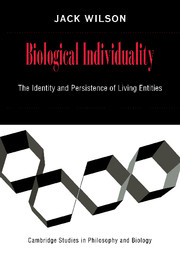Book contents
- Frontmatter
- Contents
- Acknowledgements
- 1 Beyond Horses and Oak Trees
- 2 The Biological and Philosophical Roots of Individuality
- 3 Individuality and Equivocation
- 4 The Necessity of Biological Origin and Substantial Kinds
- 5 Generation and Corruption
- 6 Personal Identity Naturalized
- Appendix: Identity and Sortals
- Notes
- References
- Index
1 - Beyond Horses and Oak Trees
A New Theory of Individuation for Living Entities
Published online by Cambridge University Press: 05 December 2011
- Frontmatter
- Contents
- Acknowledgements
- 1 Beyond Horses and Oak Trees
- 2 The Biological and Philosophical Roots of Individuality
- 3 Individuality and Equivocation
- 4 The Necessity of Biological Origin and Substantial Kinds
- 5 Generation and Corruption
- 6 Personal Identity Naturalized
- Appendix: Identity and Sortals
- Notes
- References
- Index
Summary
A main cause of philosophical disease – a one sided diet: one nourishes one's thinking with only one kind of example.
Ludwig WittgensteinINTRODUCTION
Past attempts to explain how to individuate living things have failed for two reasons. They have not assimilated a full range of biological examples or they have been misled by the most common examples and thought experiments. In this book, I explore and resolve paradoxes that arise when one applies past notions of individuality to biological examples beyond the conventional range. I also present a new analysis of identity and persistence.
My argument is based on the belief that to answer the philosophical question “What is a living individual?” it is necessary to find a satisfactory solution to the question “What should a population biologist count when she counts organisms?” Both questions seem to have clear answers when we consider stock examples. Under normal circumstances we can count the number of puppies in a litter or tomato plants in a garden. However, the same intuitions that allow us to count puppies and tomato plants with confidence leave us perplexed when we try to count colonial siphonophores like the Portuguese man-of-war. Things get strange when we extend folk notions of individuality beyond folksy uses. We can find cases in which criteria of individuation for living things that we are used to seeing hang together give contradictory answers to the question “Is it an individual?” If we take the word ‘individual’ to be synonymous with ‘particular,’ there will not be many questions at the level of the organism and below (though there may be confusion about the nature of species).
- Type
- Chapter
- Information
- Biological IndividualityThe Identity and Persistence of Living Entities, pp. 1 - 21Publisher: Cambridge University PressPrint publication year: 1999

